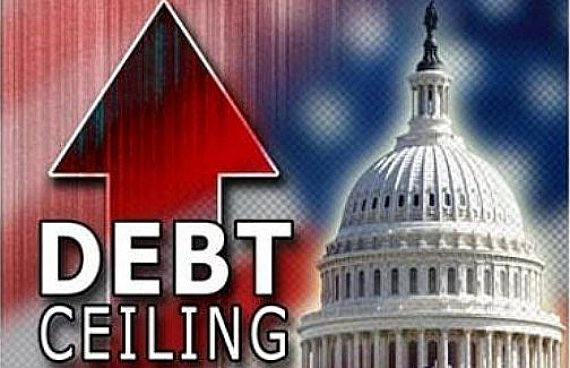Get Ready For Another Debt Ceiling Showdown
The battle lines are being drawn for another showdown over the debt ceiling.
It was just a year ago when the nation was taken to the bring over negotiations between the President Congress — as well as between John Boehner and the Tea Party Caucus in the House — over raising the debt ceiling. There were, as you will recall, those among the House GOP who harbored the idea that we didn’t have to raise the debt ceiling at all, and they clung to that belief despite the warnings from financiers and bond rating agencies and they evidence that failing to raise the debt limit would lead to serious economic problems. More than once throughout the months of June and July, it had seemed like a deal was close, perhaps even a comprehensive deal that would do more than just put a band-aid on our fiscal problem, only to have the rug pulled away at the last minute with each side blaming the other. In the end, a deal was reached, but it was so weak that it failed to prevent a downgrade of the nation’s credit rating. Congress even went through the charade of creating a “Super-Committee” that would put together a bigger deal. That super-Committee failed in the end, of course, and now Republicans are talking about undoing the package of cuts on which the whole 2011 deal was based.
As if all that weren’t bad enough, we’re quickly approaching the time when we’ll have to do it all over again. The National Debt is continuing to grow, approaching the limit that Congress had past last August. Fortunately, it looks like we’ll be able to get past the November elections without having to worry about hitting the debt limit, but it will have to be dealt with soon afterwards. Which is why you’re already starting to see the partisan bickering begin:
Washington braced Tuesday for a replay of last summer’s tense battle over the burgeoning national debt as House Speaker John A. Boehner threatened again to block an increase in the federal debt ceiling without significant new cuts in spending.
Treasury Secretary Timothy F. Geithner and other senior Democrats quickly blasted the Ohio Republican, arguing that his ultimatum could put the nation’s credit rating — and the broader economy — at risk early next year, when the debt is expected to hit its $16.4 trillion limit.
“This commitment to meet the obligations of the nation, this commitment to protect the creditworthiness of the country, is a fundamental commitment you can never call into question or violate,” Geithner said. “We hope they do it this time without the drama and the pain and the damage they caused the country last July.”
Others noted that Boehner’s call for fresh spending cuts comes as many Republicans are trying to amend cuts adopted to satisfy GOP demands last summer, arguing that they fall too heavily on defense.
“It is pretty galling for Speaker Boehner to be laying down demands for another debt ceiling agreement when he won’t even abide by the last one,” Sen. Charles E. Schumer (D-N.Y.) said. “The last thing the country needs is a rerun of last summer’s debacle that nearly brought down our economy.”
The dust-up followed the release early Tuesday of prepared remarks that Boehner later delivered at Washington’s Mellon Auditorium, where longtime deficit hawk Peter G. Peterson was staging a summit to encourage policymakers to take action to tame the debt. Participants, including senior lawmakers from both parties, agreed that that is unlikely to happen before the Nov. 6 election.
But once the election is over, they said, the issue of the debt will quickly rise to the top of the agenda — and not just because of the debt limit. In January, policymakers also will be facing the first round of harsh, across-the-board spending cuts adopted last summer, as well as the expiration of a host of tax cuts that benefit every American household. Unless Congress agrees on an alternative deficit-reduction strategy, the policies threaten to deliver a fiscal shock that could throw the nation back into recession.
House Budget Committee Chairman Paul Ryan (R-Wis.), predicted Tuesday that lawmakers would somehow avoid a year-end “train wreck.” The senior Democrat on the panel, Rep. Chris Van Hollen (Md.), said he foresees an effort to “structure a framework” to make the big decisions on taxes and spending in the first part of 2013.
Boehner, meanwhile, made it clear that he is ready to use the debt limit as a cudgel to force Democrats to compromise, particularly on a strategy for restraining spending on Medicare and other federal health programs, which are the biggest drivers of future borrowing.
“Yes, allowing America to default would be irresponsible,” Boehner said. “But it would be more irresponsible to raise the debt ceiling without taking dramatic steps to reduce spending.
Ezra Klein isn’t surprised we’re hearing this from the Speaker of the House:
For one thing, it worked well for him in 2011. Republicans got more than $900 billion in immediate spending cuts, as well as $1.2 trillion in triggered spending cuts — though they don’t much like the $500 billion or so of those cuts scheduled to fall on the Pentagon. They also drove President Obama’s approval ratings beneath 40 percent. And while I’m not one who thinks Republicans intentionally tank the economy to undermine Obama, there’s little doubt that the effect of the debt-ceiling debacle was to set back the recovery, brightening Republican prospects and darkening Democratic ones. The fact is that it’s easier to be sanguine about economic showdowns when you’re not the ones in charge.
For another, it’s Boehner’s only option in 2012. The Democrats, for once, have nothing but fiscal leverage. They’ve got the expiration of the Bush tax cuts, which all Republicans would hate and many Democrats would welcome. They’ve got the aforementioned spending trigger, which Republicans really have begun to fear for its cuts to defense spending. They can do nothing — or, more likely, offer Republicans a deal they can’t accept — and the resulting paralysis will swing fiscal policy far, far, far to the left. Threatening to default on the national debt is Boehner’s only piece of counter-leverage.
So of course Boehner will try and use the debt ceiling as leverage again. And again. And again. It’s pretty clear that, at this point, there’s no going back to the time when debt-ceiling increases came smoothly. If I were the market, I’d take the fact that the leader of one of the two parties has publicly said that he “welcomes” debt-ceiling showdowns as evidence that the United States is almost certain to default on its debt — if only temporarily — within the next decade or so.
In some sense, it is worth keeping in mind that much of what you’re hearing right now is the same kind of posturing that we saw in the months leading up to the summer showdown over the debt ceiling. At the time, I was among those who thought that we were indeed looking at posturing and that we’d end up seeing a deal in the end, although I will admit that I never quite thought it would go the way that it did. We’re seeing the same thing now, but it’s likely to be amplified by the fact that we’re in an election year and that, for both sides of the argument in Congress, the issues surrounding raising the debt ceiling also happen to be the issues that they are campaigning on. For Democrats, it’s the idea of a fiscal deal that’s “fair,” in that it includes tax increases on high income earners. For Republicans, there’s the entire idea of fiscal responsibility that is epitomized in the debt ceiling itself along with the frequent appeals to a “balanced budget.” Ordinarily I’d say that the GOP has the electoral advantage on this issue only because of the long-standing public disdain for the National Debt and opposition to raising the debt ceiling, but last year’s showdown worked out so badly for them that the old rules may no longer apply.
The important thing to remember, though, is that there isn’t likely to be an serious negotiation on this issue between now and the election. Not only because it’s traditionally next-to-impossible for Congress to get anything major done in an election year, but also because neither party is going to want to surrender too much on the issues that are going to be the central part of the Presidential election. To the extent you see anything that claims to be negotiation, all it’s really going to be is a proxy for the battles taking place in the Presidential election and the battles for control of the Senate and the House. The real deal-making, if it happens, will happen after the election.
The problem with trying to get a deal done after the election, though, is two-fold. First of all, dealing with the debt ceiling will be just another thing added to the agenda of an expected lame-duck Congress that we already know will have to deal with the expiration of the Bush tax cuts, the probable need to extend yet again the so-called Medicare “Doc Fix,” and the expiration of unemployment benefits. That’s a lot of work to get done in a short period of time, and it would become even more so if we’re dealing with a Presidential transition on top of all that. Second, as we saw in 2010, it’s not always as easy for a lame duck Congress to get things done as it might first appear, and the fact that many of the members of the Senate that will be dealing with this issue will be leaving office on December 31st makes it likely that outside pressure will make it difficult for them to get their work done. Finally, there’s the possibility that this year’s election may not resolve much of anything. It could end with Barack Obama re-elected, the GOP still in control of the House, and the Senate either narrowly Republican or narrowly Democratic but still requiring 60 votes to get anything done. If that’s the case, then we’ll be right back where we started, and our representatives will either have to make that comprehensive deal or continue faking it. Don’t be too optimistic about the prospects of a deal in that case.







Republicans already demonstrated that they are quite willing to run such a showdown to the point where S&P and or Moody’s downgrades our debt rating (causing the Dow to dive). I have no confidence that Republicans will do anything noticeably different in this round.
Republicans are not now a party of responsible governance, they’re a party of opposition to governance.
So, the guys who just wanted to break automatic sequestration, now want to cap the debt limit … math much?
Watch Obama bring it up in the election. The last debt ceiling fight was the last straw; I don’t think on a campaign trail and with the past to show he’s going to be nearly as gentle this time around. He might try to extend electoral coattails to swing districts in the House.
Doug’s right in that we will see a lot of noise and bloviating from both sides, but in the end, a deal will be made…just as a deal is made everytime we are on the cusp of something. Neither party is interested in causing a financial catastrophe.
Quite frankly, there’s nothing to see here, move along.
I notice that when you talk about what Democrats want, you put the word “fair” in quotes.
When you talk about what Republicans want, it’s fiscal responsibility, without the quotes.
Nice. Especially since I don’t remember a time when Republicans have EVER been “fiscally responsible.”
@john personna: Arithmetic has a well known liberal bias.
You severely under represent the GOP problem. The GOP House voted for the Ryan budgdt, which required raising the debt cap. They then did not want to vote for raising the cap. This is what we have to deal with in Congress.
Steve
Standard & Poor’s U.S. credit rating downgrade press release (Page 3, under the Rationale heading):
Here’s Senate Minority Leader Mitch McConnell agreeing that the GOP did exactly what S&P describes above:
And here he also broadcasted his plans to continue doing it in the future:
It’s pretty amazing that GOP leadership can publicly admit to holding the full faith and credit of the U.S. “hostage” to “ransom” or that “threat of default” is a “political bargaining chip”, and then still enjoy the support of business community proxies like the Chamber.
@Jeremy R:
Oops, I really need to stop being lazy and make an account to I can edit my posts “threat of default” and “political bargaining chip” is from the S&P Press release and shouldn’t be in my closing paragraph. The hostage taking and ransoming quotes are McConnell’s.
Well documented, Jeremy.
They ransomed the hostage once. It worked. Of course they’ll try it again!
At some point, the Dems will have to (convincingly!) say “shoot the hostage, then.” But doing that has real negative consequences for the country. It’s a no-win situation. The GOP leaders know this.
Given that the GOP has demonstrated that they will reneg on even crappy GOP-friendly deals anyway, the Dems might just have to play chicken next time. Or at least make convincing noises about doing so (yeah, I know, Democrats. Unlikely).
That old adage about laws and sausages comes to mind.
Boehner voted for the Bush Tax Cuts, which are the biggest driver of the deficit.
Now he doesn’t want to pay his credit card bill.
Eric Cantor voted for the Bush tax Cuts, which are the biggest driver of the deficit.
Now he doesn’t want to pay his credit card bill.
The Ryan/Romney Budget would require raising the debt limit. But they think they shouldn’t have to play by the same rules.
Republicans are Fiscal Frauds.
Remember that Romney when offered a 10:1 spending cut to revenue increase deal at a debate said he wouldn’t take it.
But we are supposed to take Republicans seriously when they talk about debt reduction.
Obama has spent less to this point in his term than Reagan, Bush41, or Bush43.
But we are supposed to take Republicans seriously when they talk about debt reduction.
Obama has raised the debt by around 50%. Reagan…300%.
But we are supposed to take Republicans seriously when they talk about debt reduction.
What a bunch of clowns.
It is hardly surprising that the political party that has run on a hatred of government for decades would play these games solely for political advantage…the GOP is presenting itself as a nihilist party…
Here is how this country got into the mess it is in:
Wars with no provisions on how to pay for them: “fight now, pay later”
The Barney Frank easy credit that allowed millions to purchase homes that they could not afford.
The greed of ceos at banks, investment firms, and gas companies who made millions in pay and bonuses while laying off workers, gouging the public (gas prices, bank fees) and stealing people’s investments.
Inordinate and unimaginable salaries of “professional” athletes, entertainers, and college sports.
Attitude of many people that the government owes them something and that they have a right to other peoples’ money (envy, greed)
This is a result of the situation ethics, “I’m okay, you’re okay”, do your own thing philosophy that took hold in the 1970’s. Total absence of absolutes, morals, and personal responsibility. Blame it on anything and everyone else. There is no shame anymore. Anything goes and the rules can be bent or even changed. Once, we were challenged to ask what we could do for our country. Now it is “I’ll get mine while the gettin’s good” , “When’s the country going to do something for me?”
The leaders of the 20th. century were statesmen of honor and integrity: Truman, Eisenhower, Marshall, MacArthur, and many others who put the country first; not their own greed and desires. There are no statesmen anymore.
I have to say…I had the same access to Barney Frank’s so-called “easy credit” as millions of other Americans…yet I have come out of this recession in much better shape than I went in.
The same people who claim guns don’t kill, people do…are the same ones who blame Barney Frank for the idiocy of mortgagees. You can’t have it both ways people. Either people are accountable for their actions, or they aren’t.
@Steve:
What galls me is the “both sides do it” dodge. If one side does something 10 times, and the other side once, then, yes, technically both sides do it. but really, we know better.
I think Republicans feel that they can run the table on the budget and deficit issues – it’s a zero-sum exercise for them.
@Hey Norm:
The Barney Frank thing is pretty funny (especially since, if you want to scream about Free Money, you could talk about Greenspan’s work at the Fed, but he’s just been disappeared down the memory hole). It’s of a piece with the “CRA did it!” (translation: it’s all Jimmy Carter’s fault) and “poor people buying too much house” stuff. It makes no sense, especially in light of the fact that the real estate bubble was a multinational thing.
Barney, Chris Dodd, and other Dems likely played a roll in the mess. But this line of attack is all about hiding the Elephants in the room. 😉